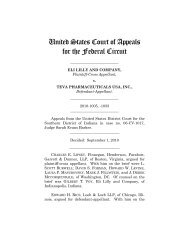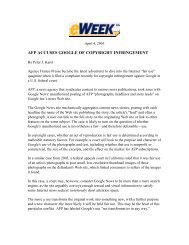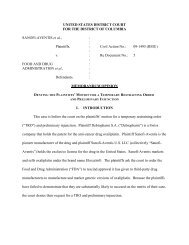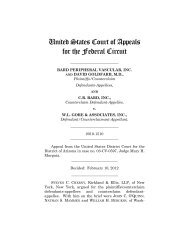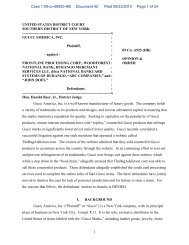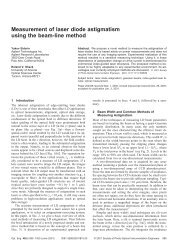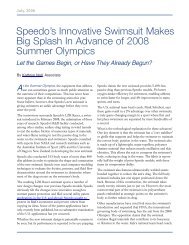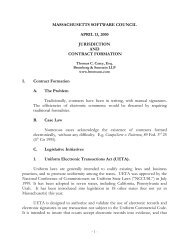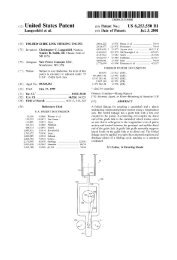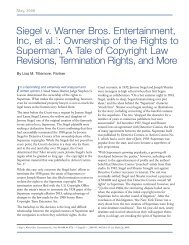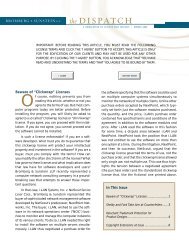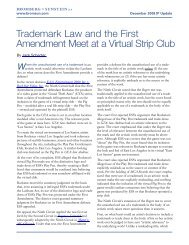- Page 3: THE EVOLVING IP MARKETPLACE:ALIGNIN
- Page 7 and 8: THE EVOLVING IP MARKETPLACE:ALIGNIN
- Page 9 and 10: innovation with significant benefit
- Page 11: calculating patent damages and reco
- Page 14 and 15: ecause they occur before the purcha
- Page 16 and 17: • Language is inherently imprecis
- Page 18 and 19: Improving the Ability to Understand
- Page 20 and 21: enables all participants in the pat
- Page 23 and 24: Recommendation. The Commission reco
- Page 25 and 26: Two current legal rules fail to giv
- Page 27: than the economic value of their in
- Page 31 and 32: Recommendation. Courts should elimi
- Page 33 and 34: 21Irreparable harm/inadequacy of mo
- Page 35 and 36: Remedies Following Denial of an Inj
- Page 37 and 38: CHAPTER 1EVOLVING PATHWAYS OF INNOV
- Page 39 and 40: 5and 2009 explored two: (1) notice,
- Page 41 and 42: and costs have fallen. As a represe
- Page 43 and 44: Only 4.4% was undertaken by compani
- Page 45 and 46: expensive manufacturing facilities.
- Page 47 and 48: commercialization, either by the or
- Page 49 and 50: B. Patenting by Small Companies and
- Page 51 and 52: attempt to win back customers. Pate
- Page 53 and 54: delve into that issue. Patent quali
- Page 55 and 56: CHAPTER 2THE EVOLVING PATENT MARKET
- Page 57 and 58: competition. The business model of
- Page 59 and 60: failure to transfer the technology
- Page 61 and 62: 19advance of commercialization. Man
- Page 63 and 64: explains that licensing fees for qu
- Page 65 and 66: 35years ago. For several companies,
- Page 67 and 68: the active development or practice
- Page 69 and 70: 61business models, some of which ar
- Page 71 and 72: interest in patent portfolios. For
- Page 73 and 74: 86 87patents. Such defensive buying
- Page 75 and 76: 97technologies.” Representatives
- Page 77 and 78: 109commercialize viable technology.
- Page 79 and 80:
CHAPTER 3PATENT NOTICE: A COMPETITI
- Page 81 and 82:
4Yet, until recently, notice concer
- Page 83 and 84:
15investment in innovation.” If f
- Page 85 and 86:
29unclear patent claims that increa
- Page 87 and 88:
42met.” Indeed, panelists viewed
- Page 89 and 90:
panelist explained, continuing, “
- Page 91 and 92:
74making it difficult to predict th
- Page 93 and 94:
B. Difficulties in Foreseeing Evolv
- Page 95 and 96:
magnified when an applicant uses re
- Page 97 and 98:
[purchased] chip other than what it
- Page 99 and 100:
132their R&D strategies and before
- Page 101 and 102:
Circuit opinions framed the indefin
- Page 103 and 104:
Some of the panelists gave Miyazaki
- Page 105 and 106:
Miyazaki approaches indefiniteness
- Page 107 and 108:
Of course, claims may be functional
- Page 109 and 110:
186purposes, “unlikely to result
- Page 111 and 112:
198possession.” Another observed,
- Page 113 and 114:
This report does not attempt to mak
- Page 115 and 116:
219for assessment) as technologies
- Page 117 and 118:
Inclusion of such a glossary in a p
- Page 119 and 120:
Several steps could be taken. The p
- Page 121 and 122:
A further step would be to encourag
- Page 123 and 124:
problems that this may pose. This s
- Page 125 and 126:
272quite thin, however, and the ful
- Page 127 and 128:
specification to project the future
- Page 129 and 130:
filing date. So long as the origina
- Page 131 and 132:
third parties who (i) infringe pate
- Page 133 and 134:
1. Improving the Ability to Search
- Page 135 and 136:
320patents. In discussing ways to e
- Page 137 and 138:
is a problem, knowing the owner is
- Page 139 and 140:
346copyists to avoid liability. Mor
- Page 141 and 142:
that supports collaboration among f
- Page 143 and 144:
CHAPTER 4THE ECONOMIC AND LEGAL FOU
- Page 145 and 146:
2market mechanism. A patentee can o
- Page 147 and 148:
innovate, remedies must compensate
- Page 149 and 150:
Lost profits damages will not be ap
- Page 151 and 152:
Remedies that systematically underc
- Page 153 and 154:
unnecessarily increasing the number
- Page 155 and 156:
CHAPTER 5LOST PROFITS DAMAGESI. INT
- Page 157 and 158:
improvements, including rejection o
- Page 159 and 160:
undercompensation. Patentees should
- Page 161 and 162:
value of the patented product. The
- Page 163 and 164:
is entitled to “no less than a re
- Page 165 and 166:
CHAPTER 6THE HYPOTHETICAL NEGOTIATI
- Page 167 and 168:
This Chapter and Chapter 7 seek to
- Page 169 and 170:
13product. IT products, such as per
- Page 171 and 172:
medians “tell[s] you very little
- Page 173 and 174:
33would have guided the parties dur
- Page 175 and 176:
42 43agreed. In Golight, Inc. v. Wa
- Page 177 and 178:
Second, even if the parties had sim
- Page 179 and 180:
The court reached this result by ac
- Page 181 and 182:
lack of notice. That result could l
- Page 183 and 184:
CHAPTER 7CALCULATING REASONABLE ROY
- Page 185 and 186:
I. INTRODUCTIONCHAPTER 7CALCULATING
- Page 187 and 188:
This list has become “virtually c
- Page 189 and 190:
15would have informed the licensing
- Page 191 and 192:
courts should recognize that the fi
- Page 193 and 194:
importance of the value of the pate
- Page 195 and 196:
48sound economic data and with actu
- Page 197 and 198:
Recommendation. To prevent damage a
- Page 199 and 200:
68“reasonable.” More generally,
- Page 201 and 202:
methodologies to the facts of a par
- Page 203 and 204:
89more than damages.” For reasona
- Page 205 and 206:
Recommendation. In their gatekeeper
- Page 207 and 208:
110program.” The patentee offered
- Page 209 and 210:
121businesses to allow for use of t
- Page 211 and 212:
132total revenues for an infringing
- Page 213 and 214:
145 146“basis for customer demand
- Page 215 and 216:
ecause it can be purchased separate
- Page 217 and 218:
167revenue.” One panelist pointed
- Page 219 and 220:
CHAPTER 8PERMANENT INJUNCTIONS IN P
- Page 221 and 222:
I. INTRODUCTIONCHAPTER 8PERMANENT I
- Page 223 and 224:
Justice Kennedy’s concurring opin
- Page 225 and 226:
15they invest in research and devel
- Page 227 and 228:
Panelists identified several ways i
- Page 229 and 230:
The potential for hold-up caused by
- Page 231 and 232:
searches. We thoroughly analyze all
- Page 233 and 234:
understood to provide ex ante incen
- Page 235 and 236:
62start-ups, semiconductor design h
- Page 237 and 238:
that primarily engage in technology
- Page 239 and 240:
83public health and safety. Since e
- Page 241 and 242:
91 92of hardships may support denia
- Page 243 and 244:
ongoing royalty determinations impe
- Page 245 and 246:
VII.REMEDIES IN THE INTERNATIONAL T
- Page 247 and 248:
The 2009 Saxon case, in which a pat
- Page 249 and 250:
ut its language should allow consid
- Page 251 and 252:
APPENDIX ASTATISTICS DESCRIBING PAT
- Page 253 and 254:
Chart 2 9The PricewaterhouseCoopers
- Page 255 and 256:
Chart 4 17The authors of the Pricew
- Page 257 and 258:
II.Lemley and Shapiro StudyProfesso
- Page 259 and 260:
APPENDIX BOVERVIEW OF POST-eBAY PER
- Page 261 and 262:
defendant, a remedy in equity is wa
- Page 263 and 264:
To gain a better understanding of h
- Page 265 and 266:
Potentially RelevantFact PatternNum
- Page 267 and 268:
on whether the parties competed and
- Page 269 and 270:
One case has recognized that the re
- Page 271 and 272:
56funded additional projects and di
- Page 273 and 274:
stating that non-practicing patent
- Page 275 and 276:
effect of an injunction on the infr
- Page 277 and 278:
promoting innovation for public ben
- Page 279 and 280:
Boston Scientific Corp. v. Johnson
- Page 281 and 282:
Becton Dickinson & Co. v. Tyco Heal
- Page 283 and 284:
Power Integrations, Inc. v. Fairchi
- Page 285 and 286:
V. Questionnaire Used in Malin Stud
- Page 287 and 288:
ParticipantEarl (Eb) BrightGeneral
- Page 289 and 290:
ParticipantHoracio GutierrezCorpora
- Page 291 and 292:
ParticipantAron LevkoPrincipal, Pri
- Page 293 and 294:
ParticipantJeffrey MyersVice Presid
- Page 295 and 296:
ParticipantSteven D. SingerPartner,
- Page 297 and 298:
ParticipantRosemarie ZiedonisAssist
- Page 299 and 300:
APPENDIX DPUBLIC COMMENTS AND PRESE
- Page 301 and 302:
NameComment DateSchlicher, John May
- Page 303 and 304:
Steve Malin, Empirical Analysis of
- Page 305 and 306:
DAMAGES(February 11, 2009)Panel 1:S
- Page 307 and 308:
MARKETS FOR INTELLECTUAL PROPERTY(A



